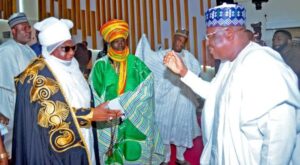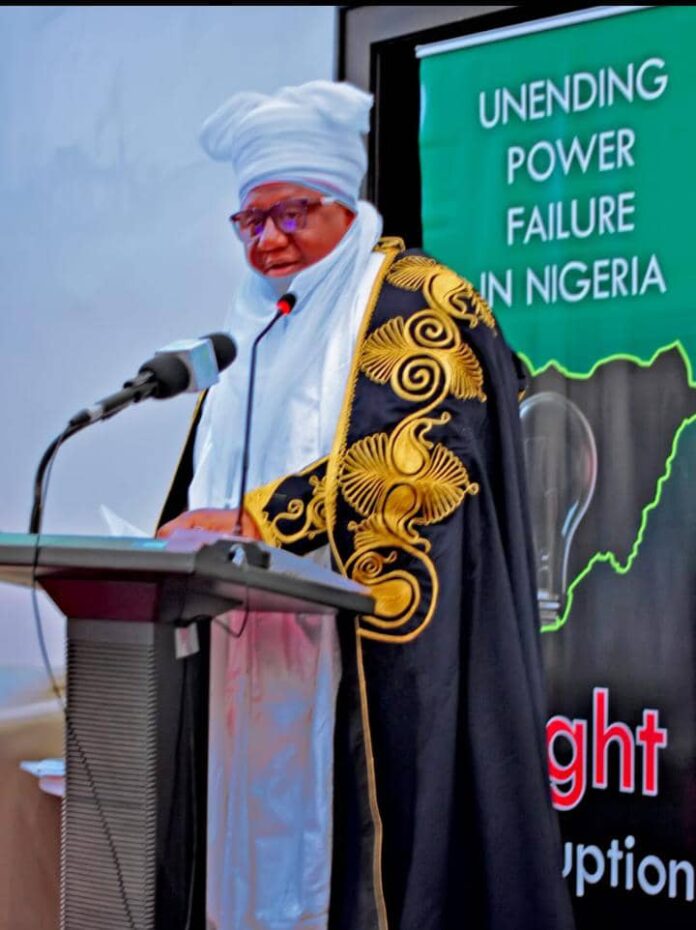Emir of Keffi identifies ways to tame corruption, insecurity in Nigeria
Story from Ibraheem Hamza MUHAMMAD, Lafia
Dr Shehu Chindo Yamusa III, Emir of Keffi in Nasarawa State, has disclosed ways to tame corruption and insecurity in Nigeria.
He made this known in his goodwill message during a commemoration of the national policy dialogue on corruption and insecurity in Nigeria organised by Anti-Corruption Academy (ACAN) at the Independent Corrupt Practices and other Related Offences Commission (ICPC) auditorium, Abuja.
“I am calling on the agency to come up with concrete models towards eradicating electoral corruption and producing a policy brief that will guide the national response to vote buying phenomenon in Nigeria. I urge anti-corruption agencies and other security agencies to expose the misconduct of staff, as well as protect whistle-blowers on corruption and insecurity.
“It is necessary to call on the International Anti-Corruption Academy to work in synergy with municipal Nigeria Agency in fostering dialogue to increase awareness and facilitate activities towards preventing and combating corruption and related vulnerable malpractices in our society,” the Emir said.
Speaking on the matter of national security, the Emir asked rhetorically saying: “Are we all secured? How secure is Nigeria’s economy? Does the country have a secured organisational structure? Is the chance of an external attack on us negligible?

He suggested that a proactive national conference be organised to come up with preventive measures to halt the security situation which has caused both economic and social paralysis in Nigeria.
Dr Yamusa called on Nigerians to work with relevant security agencies towards achieving the vision to make Nigeria a more safe, just, peaceful, prosperous and strong nation.
He commend the National Security Adviser (NSA), General Babagana Monguno, for being dogged and patriotic in attaining a justifiable feat on national security.
Dr Shehu Chindo Yamusa III wished the NSA strength in discharging his primary responsibility in ensuring that the Defence Intelligence Agency (DIA), National Intelligent Agency (NIA) and Department of State Security (DSS) have quality assurance in their formations.
“I am optimistic that this assembly on National Policy Dialogue will not only produce a policy brief based on the subject matter but will serve as a guide in the conduct of national security and nailing all forms of corrupt practices.
“On the role of traditional and religious leaders in tackling corruption and insecurity challenges in Nigeria. I urge my colleagues to support the implementation of the policy framework and national action plan for preventing and countering all forms of corrupt practices and issues threatening national security,” the Emir said.
In his speech, Professor Bolaji Owasanoye, Chairman of the Independent Corrupt Practices and other Related Offences Commission (ICPC) said: “At face value, insecurity is seen to be and is sometimes treated as a matter requiring only a military response or reaction but an in-depth look into its possible root cause(s) shows that corruption is a major contributory factor to the continued existence and propagation of insecurity in the country.
“In fact, a clinical diagnosis of the insecurity menace in the country reveals that to effectively combat insecurity, we require the collaborative efforts of security agencies (military, intelligence, police, customs, prisons, others), as well as law enforcement and anti-corruption agencies.
“ICPC’s research and findings on the subject matter show that public sector corruption, directly and indirectly, enables insecurity, and can sometimes complement it.
“Cases of job racketeering abound in the security sector, many of which are under investigation by the ICPC.
“Part of our interrogation today is why has this proactive effort not been translated into commensurate effectiveness in the war against insurgency and insecurity and despite the gallant and sacrificial effort of our soldiers, policemen and other security operatives working daily to secure Nigerians.
Also speaking, Senate President Ahmad Lawan said the National Assembly was looking into the possibility of anti-corruption law to stop illicit financial flows suspected to be funding routes for insecurity in Nigeria.
He said: “Insecurity has placed an enormous demand on our country’s human and material resources, particularly the emergence of the Boko Haram insurgents in the Northeast and banditry in the Northwest.
“Several other security challenges have since emerged afterward. We have been faced with cattle rustling and farmer-herder clashes in the middle belt, secessionist agitations in the South East, and militancy in the south-south, some of these have now spilled over to other parts of the country.
“The span of these security challenges have profoundly tasked this administration and indeed the nation and stretched our security and law enforcement apparatus which remains determined and has withstood these challenges with the utmost gallantry. But as I have always said, the challenges of our security infrastructure are the concern of all of us and not just of those in government alone,” Lawan said.
Follow the Neptune Prime channel on WhatsApp: https://whatsapp.com/channel/0029Va74ZvU2v1IqKByXoX3d
Do you have breaking news, interview request, opinion, suggestion, or want your event covered? Email us at neptuneprime2233@gmail.com


